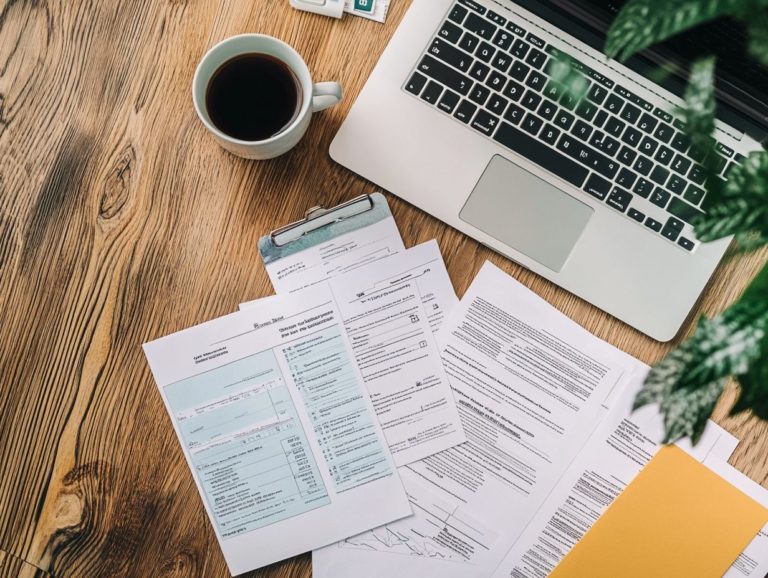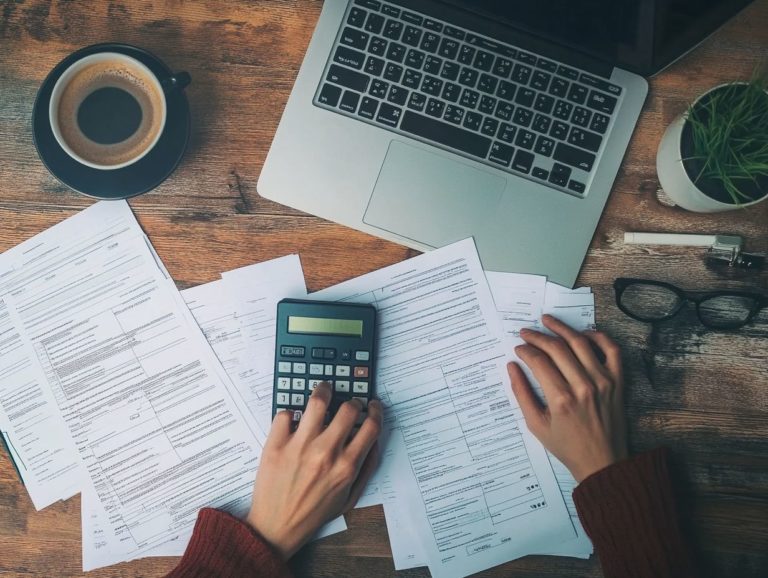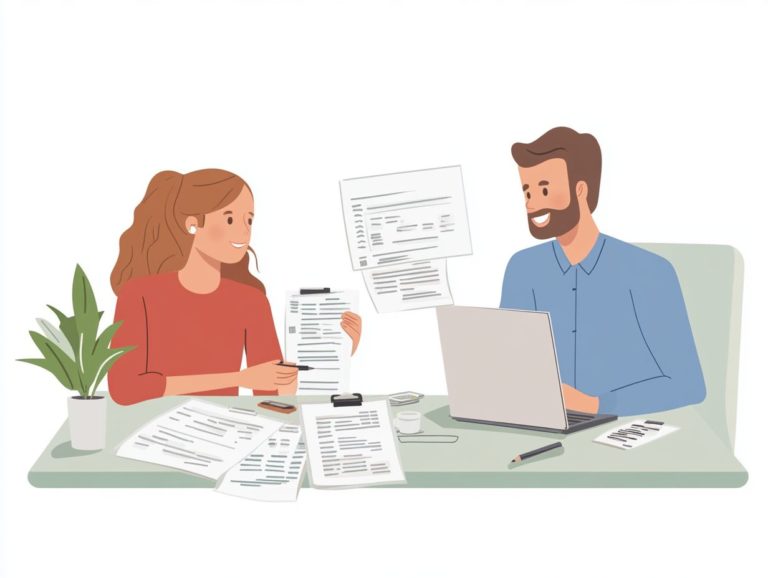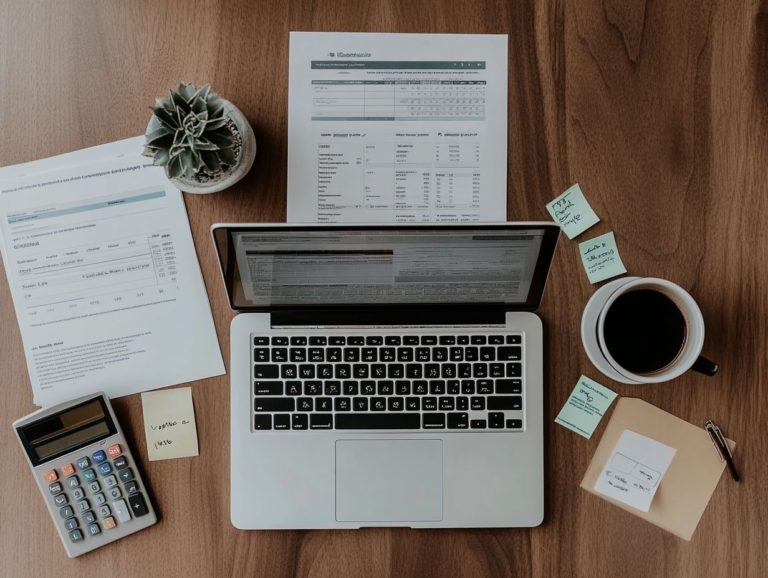How to Claim Business Expenses as a Freelancer
Understanding the complexities of taxes can pose significant challenges for freelancers. It’s crucial for you to grasp which business expenses are eligible for deductions, as this knowledge is key to maximizing your deductions and minimizing your tax liabilities.
This article meticulously outlines the various types of expenses you can deduct, provides valuable tips for organizing and documenting them effectively, and walks you through the claiming process. It also highlights common pitfalls to avoid, ensuring you make the most of your hard-earned income.
Immerse yourself in this information to take command of your tax strategy!
Contents
- Understanding Tax Deductions
- Types of Business Expenses for Freelancers
- Keeping Track of Business Expenses
- Claiming Business Expenses on Taxes
- Maximizing Business Expense Deductions
- Tips for Maximizing Deductions
- Potential Red Flags for Business Expenses
- Common Mistakes to Avoid
- Frequently Asked Questions
- What are considered business expenses for a freelancer?
- How do I keep track of my business expenses as a freelancer?
- Can I claim business expenses if I work from home as a freelancer?
- What is the process for claiming business expenses as a freelancer?
- Are there any limits to the amount of business expenses I can claim as a freelancer?
- Can I claim business expenses from previous years as a freelancer?
Key Takeaways:

- Keep track of all business expenses and organize them properly to ensure eligibility for tax deductions.
- Familiarize yourself with the forms and processes for claiming business expenses on taxes to avoid potential red flags and common mistakes.
- Maximize your business expense deductions by following tips such as separating personal and business expenses and knowing which expenses are eligible for deductions.
Understanding Tax Deductions
Understanding tax deductions is essential for freelancers aiming to manage their finances effectively and minimize their tax burden. Tax deductions allow you to lower your taxable income by writing off specific costs tied to your business operations.
As a freelancer whether you’re an independent contractor or working in the flexible job market where people hold temporary positions you likely encounter unique expenses that can be deducted. These might range from marketing costs to home office deductions.
Grasping what qualifies as a deductible expense is crucial for optimizing your tax return and ensuring compliance with IRS regulations.
Types of Business Expenses for Freelancers
As a freelancer, you ll encounter a range of business expenses that can be strategically leveraged for tax deductions, enabling you to lower your taxable income while enjoying the freedom of flexible work and diverse income streams.
From the marketing costs you incur to promote your services to educational expenses aimed at enhancing your skills, understanding these expenses is crucial for effective tax planning.
Many freelancers turn to tax software like TurboTax Deluxe or TaxSlayer Premium to categorize these expenses meticulously, ensuring they maximize deductions and minimize their tax liabilities.
Common Expenses and Eligibility
Understanding common expenses and their eligibility is crucial for freelancers, especially if you’re looking to optimize your tax returns while staying in line with IRS standards. You can deduct various business-related expenses, which might include costs tied to marketing, bookkeeping services, and communication expenses.
Familiarizing yourself with the IRS standards for what qualifies as a deductible expense will allow you to accurately report your financial transactions and effectively minimize your tax liability.
These deductions can significantly impact your overall income taxes, making it essential to maintain detailed records. For instance, if you’re self-employed and meet the adjusted gross income criteria, you can deduct health insurance premiums. Additionally, expenses for setting up a home office like office supplies and equipment can also be claimed, as long as they’re exclusively used for business purposes.
Grasping these criteria can lead to a more favorable tax outcome, allowing you to concentrate on your creative pursuits without the looming worry of unexpected liabilities.
Keeping Track of Business Expenses

Keeping track of your business expenses is an essential practice for freelancers, serving as a cornerstone for accurate tax reporting and overall financial health.
Effective bookkeeping means you meticulously monitor your financial accounts, encompassing your income streams and all relevant business expenses, like payment processing fees and advertising costs.
By maintaining organized records, you empower yourself to quickly identify deductible expenses come tax season, ensuring compliance and optimizing your tax returns.
Start tracking your expenses today and secure your financial future!
Organizing and Documenting Expenses
Organizing and documenting your expenses is essential for accurate tax reporting and compliance with IRS regulations. This means categorizing your business-related expenses, whether they involve vehicle costs or communication fees, and maintaining detailed records of every financial transaction.
Using bookkeeping services and digital tools can streamline this documentation process, making it easier to claim deductions and manage your finances effectively.
One effective strategy is to leverage accounting software or mobile apps that help you track your expenses in real time. These tools often include features like receipt scanning, automatic categorization, and comprehensive reporting capabilities, simplifying your financial management.
Thorough documentation can protect you from potential audits. Accurate records provide the transparency needed during tax season. It’s also wise to set up a separate bank account for your business transactions, allowing you to easily identify and organize expenses when tax time rolls around.
Claiming Business Expenses on Taxes
Claiming business expenses on your taxes is crucial and can greatly influence your tax returns and overall financial responsibilities. Understanding the necessary forms and procedures for claiming these expenses is vital, especially when dealing with self-employment tax, which is the tax paid on income earned from working for yourself, and estimated taxes.
Accurately reporting your deductible expenses can significantly reduce your tax liability. This gives you the freedom to focus on your income streams and the flexibility of your work.
Forms and Processes for Deductions
Understanding the various forms and processes for tax deductions is essential for freelancers aiming to optimize financial strategies. Using tax software like TurboTax or consulting with a CPA can simplify your tax preparation and filing, ensuring that all eligible deductions are claimed effectively.
Familiarize yourself with key forms such as the Schedule C, which reports your income and expenses, and the Schedule SE, used for self-employment tax calculations. Gathering receipts for business expenses like equipment, travel, and home office costs is crucial, as these significantly impact your taxable income. To ensure you’re maximizing your savings, consider checking out Maximizing Deductions: A Freelancer’s Guide.
The deduction process involves calculating your net profit or loss and entering relevant figures into the appropriate forms. Tax software not only simplifies these calculations but also provides guidance on maximizing your deductions. Collaborating with a CPA can offer personalized strategies that go beyond software capabilities, helping you navigate complex tax situations while ensuring compliance with tax laws.
Maximizing Business Expense Deductions

Maximizing business expense deductions is a smart strategy to lower your taxable income and boost your overall profitability. By understanding the nuances of retirement contributions and identifying all deductible taxes, you can ensure that you aren t leaving money on the table.
This proactive approach to tax planning eases your tax burden and fortifies your financial health over time. Don t miss out on potential savings!
Start tracking your expenses today and take control of your financial future!
Tips for Maximizing Deductions
As a freelancer, you have a wealth of opportunities to maximize deductions that can significantly enhance your financial outcomes. Start by diligently documenting education expenses related to skill enhancements. Familiarize yourself with which marketing costs qualify as business deductions.
Tracking your vehicle expenses using the IRS standard mileage rate, a set rate you can use to calculate vehicle expenses for tax purposes, can lead to substantial savings on your tax returns.
It’s essential to maintain organized records of all your business-related receipts. This practice simplifies your tax preparation process and substantiates your claims during audits. Additionally, learning how to track your freelance expenses efficiently can help streamline your workflow and make categorizing expenses a breeze.
Don t miss out on valuable deductions! Consulting with a tax professional can help you strategically plan your deductions based on your projected income and expenses throughout the year. By taking these proactive measures, you can maximize your potential deductions and minimize the stress that often accompanies tax season.
Potential Red Flags for Business Expenses
Identifying red flags in your business expenses is crucial. This helps you avoid common mistakes that could lead to higher taxes or audits.
Practices such as misclassifying personal expenses as business-related or neglecting to keep adequate records can certainly catch the IRS‘s attention. By staying mindful of these pitfalls and embracing best practices, you can navigate tax season more smoothly and safeguard your financial well-being.
Common Mistakes to Avoid
Avoiding common mistakes is crucial for freelancers like you to effectively manage your business-related expenses and ensure accurate tax returns. It’s easy to overlook critical deductions, miscalculate expenses, or neglect detailed record-keeping, all of which can significantly impact your profits.
To mitigate these issues, prioritize maintaining thorough records for all your expense-related activities. Retaining receipts, invoices, and bank statements in an organized manner will serve you well for future reference.
Categorizing your expenses into specific areas like travel, office supplies, and software subscriptions not only aids in tracking your financial health but also streamlines the tax filing process.
Utilizing accounting software can simplify accurate expense tracking and reporting, minimizing errors along the way. Ultimately, by establishing a consistent routine for your financial documentation, you can safeguard your earnings and maximize your potential deductions.
Frequently Asked Questions

What are considered business expenses for a freelancer?
Business expenses for a freelancer can include any costs that are directly related to your business, such as office supplies, advertising and marketing expenses, travel and transportation expenses, and professional fees. These expenses must be necessary and ordinary for your business.
How do I keep track of my business expenses as a freelancer?
It’s important to keep accurate records of your business expenses as a freelancer. This can include keeping receipts and invoices, using accounting software, or keeping a detailed spreadsheet. You should also separate your personal expenses from your business expenses for easier tracking.
Can I claim business expenses if I work from home as a freelancer?
Yes, you can claim a portion of your home office expenses if you work from home as a freelancer. This can include rent, utilities, internet, and home office supplies. You will need to calculate the percentage of your home that is used for business purposes and only claim that portion as an expense.
What is the process for claiming business expenses as a freelancer?
The process for claiming business expenses as a freelancer may vary depending on your country and tax laws. Generally, you will need to keep records of your expenses, provide proof of purchase, and have a separate business bank account. It’s best to consult with a tax professional to ensure you are following the correct process.
Start tracking your expenses today to maximize your tax savings!
Are there any limits to the amount of business expenses I can claim as a freelancer?
Limits on business expenses you can claim depend on your country and tax laws.
Some expenses have a maximum amount, while others vary based on your income. Don’t miss out on potential savings! Understand the limits that may affect your claims.
Can I claim business expenses from previous years as a freelancer?
If you missed claiming certain business expenses in prior years, you may still qualify to claim them.
This is often referred to as tax deductions or carry-forward expenses. You could still benefit from previous expenses! Check if you re eligible to maximize your tax deductions.






